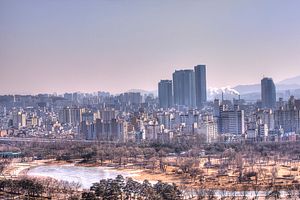In a survey conducted on February 7, right after the New Year holidays, approval rates of South Korea’s ruling Democratic (Minjoo) Party and the opposition Liberty Korea Party stood at 37.8 percent and 29.7 percent, respectively.
It was the first time the opposition party had narrowed the approval rating gap within 10 percent since the Democratic Party’s Moon Jae-in became president in May 2017. The gap was more than double that in October 2018, after the inter-Korean summit in Pyongyang, making the Liberty Korea Party’s current position notable.
The Democratic Party itself might be the one to blame for this. In particular, the conviction last month of Moon’s close aide, South Gyeongsang Governor Kim Kyoung-soo, in a social media manipulation scandal was a huge blow to Moon and the ruling party.
After the conviction, in particular, the ruling party seemed to have lost support from people in their 20s. According to the poll mentioned above, the approval rate for the Democratic Party among people in their 20s stood at 27.8 percent, while those of Liberty Korea Party were 27.6 percent.
Before Kim’s conviction, approval for the ruling party among this group was 40.5 percent, while those for the opposition stood at 14.5 percent, indicating that there has been a dramatic shift in public opinion in recent months.
Kim’s conviction is only the tip of the iceberg. Moon and his party are currently entangled with several scandals, among them allegations against a core member of the Democratic Party, Shon Hye-won, and Moon’s daughter.
This appears to be an excellent opportunity for the Liberty Korea Party to regain public support and lay out the groundwork for the 2020 National Assembly elections, or ever the next presidential election in 2022. But its actions over the last month have been somewhat disappointing.
First, three Liberty Party Korea members made controversial comments on a 1980 pro-democracy uprising in Gwangju, the May 18 Democratic Uprising. In the South Korean city of Gwangju from May 18 to 27, 1980, citizens demonstrated against the martial law government. Hundreds of people were either severely injured or killed as a result of a harsh crackdown by the government.
While the uprising is widely respected and commemorated by South Korea, some groups or individuals claim that the demonstration was tainted by North Korea or, more broadly, by communist ideology.
Three lawmakers, namely Kim Jin-tae, Kim Soon-rye, and Lee Jong-myeong, have come under fire for holding a public forum on February 8 where the controversial comments were made. For instance, Lee said the Gwangju uprising was merely a riot, but some people with political and ideological purposes had turned it into a democratization movement. Kim Soon rye referred to those honored for participation in the movement as “monsters.”
Such remarks attracted a backlash from both the ruling party and the public. Moon also publicly expressed his anger at the three lawmakers.
Amid the growing criticism, Liberty Party Korea decided to distance itself from the three lawmakers, by expelling Lee from the party and considering further actions against the other two.
However, that decision failed to suppress public discontent toward the party, while it sparked new criticism among more conservative supporters who believe that Liberty Party Korea “caved in” too quickly.
It is understandable that Liberty Korea Party extremely sensitive to changes in public opinion, as the party is finally beginning to see its approval rates catching up after experiencing a severe drop since the impeachment of the former President Park Geun-hye, who was backed by the party in its former incarnation as the Saenuri Party.
However, if the Liberty Korea Party becomes too sensitive to public opinion its policies will begin to conflict with the party’s conservative identity.
In contrast, the ruling Democratic Party of Korea appears to have little thought for how the public sees them. Most of the scandals related to the party have not been fully explained. Instead, the Democratic Party has been busy with finding ways to blame others, including the Liberty Korea Party.
No wonder many of its supporters have turned their backs, causing a recent drop in approval rates.
Clearly, the two main parties in South Korea have something to learn from each other when it comes to responding to public criticism.
































